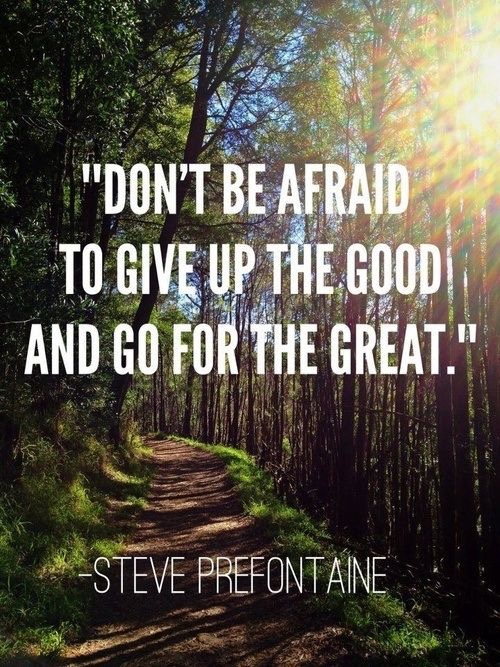Technically, I did. My last 20-miler turned into a 17.2 mile run. My right leg, directly below the calf, began nagging me on mile 8. It's just the uphill that's irritating it. (It was uphill for the first 10 miles). I plugged on. This was my easiest 20-miler to date; my breathing was relaxed, my shoulders were finally pushed down (light bulb moment: keep your chin up, literally!), and my legs felt fresh. Then, right around 16.5 on a nice easy stretch of downhill, I took a step, inhaled sharply and swore loudly.
Pain. All the way up my leg. Acute, stabbing pain.
Done. I had hit the point of diminished returns. Those next three miles weren't going to do anything more for my training other than possibly worsen a potential injury.
In an unprecedented display of mental flexibility, I calmly pulled out my phone and called Brian. Last long run = dunzo.
(The additional .7 miles is after that mental flexibility faded and dogged tenaciousness resumed. A bit more running just to "test things out" - and to get to at least 17 miles).
The gravity of what I had done didn't hit me until later that night. YOU DIDN'T FINISH YOUR LONG RUN! my brain screamed. I went to log my weekly miles and found myself under 40. This was supposed to be my last week of big miles; I had failed. I missed my target. Who am I to think I can BQ if I can't even get through a 20 mile run?
That's been on my mind since Cedar City. Sure, maybe you're thinking, "Dude, you ran a half in 1:39. That translates to (1:39 x 2 [+10 min]=) a 3:28 marathon." To qualify for Boston, based on my age, I have to come at three hours, forty minutes or less. Really, it needs to be around 3:37, since the BQ cutoff can be up to 2 to 3 minutes under your qualifying time. That translates to about 8:18 per miles. For 26.2 miles.
(If none of this is making any sense, I apologize. An entry explaining Boston-qualifying times - and why Boston is such a big deal - is coming later this week).
But the thing is, I'm doing better with shorter distances than longer ones lately. While my speed work has been strong, my long runs have suffered. Either I go too fast down Mt. Charleston or too slowly up Charleston Ave (Why is everything in this town called some version of "Charleston?") Worse, I loathed the long runs. All of them. I felt anxious the night before, consequently slept poorly, and then just hated every step of those runs. Well, except the first one when I was drunk on downhill momentum.
So while I have had recent success in 5Ks, 10Ks, and half marathons, the marathon remains an enigma to me. It's that post-20 mile body-breakdown that stands out most clearly in my mind. That feeling in LA when I wound my way up that stupid hill on mile 21. The way I felt on mile 24 ("where is the mother-f*cking downhill?"). Passing my family on mile 26 and being just devastated to see my watch read +4 hours.
On Saturday, as I laid on the couch petting Chewie (the softer, nicer kitten), clad in my tightest compression socks, I realized: I'm tired. Really, really tired.
Not physically, but mentally. I'm worn down.
As I thought back, I realized I've thought about Boston every day for the last nine months and twenty-two days. BQing was one of my new year's resolution; brash, ballsy, and completely unfounded in reality.
It's one thing to set a goal to run a marathon; with enough planning, you can do it within a year. It's another thing to set a time goal for a marathon. That's a little more complicated. It's complete insanity to think you can improve your marathon time by THIRTY-FOUR MINUTES in the span of ten months without injury and/or mental breakdown.
I honestly thought Boston was pie in the sky until that 5K in May. It wasn't my time that surprised me; it was coming in 3rd overall. Me? Third? I get a tiny plaque? Well...thank you, I'm honored. BQ-ing felt more attainable than ever after every race this summer. I watched my numbers go down because my speed went up. Brian built me a tiny Shelf of Achievement in the kitchen to highlight my (very small) collection of awards. Boston qualifiers have trophy rooms; they too likely started with a shelf. I was on my way!
Cedar City was incredible and so much fun, but in all honesty, it was mostly downhill. Severely downhill. As in, 4-8% down grade. Yeah, yeah, downhill poses its own challenges, I know, but it's not an accurate predictor of George. George is down but not that down. More concerning, I was tired at the end of Cedar City; not completely spent, but ready to be done. How in the world was I going to pull that off again, this time with an additional 13.1 miles tagged on the back?
I began fantasizing about giving up. Skip my uber-early pre-boot camp runs. No more Track Tuesdays and tuba players. Saturdays could be spent making pumpkin pancakes, not plugging along Hwy 159. And while we are on the topic of pancakes - FOOD! What would it be like to eat whatever I wanted? I think there's this fallacy among the general public that runners get to eat whatever they want. That couldn't be more untrue. Diet has never been more important because of its role in recovery. What would it be like to not plan, examine and ruminate over every bite of food?
Last week, the marathon hunger hit hard. More days than not found me in the kitchen, snarfing down large bowls of vegan chili at 10am. One afternoon before baseball practice, I accidentally pounded 5 harvest cookies that were innocently sitting on the counter. Five, one after another, without thinking. I was so hungry. I immediately freaked out over what I had done. I have to carry those 5 cookies with me on the next run! That's like, 475 calories! Of simple carbs and fat, that will likely stick directly on my hips. I could care less how I look; it's carrying that extra weight up a hill that matters.
If I gave up now, I could have a beer. I could eat the cake I didn't get on my birthday. My toes wouldn't be super sensitive, I could stay up later than 8:30, and maybe, just maybe, my husband and I could have a normal date night. One that doesn't involve compression socks.
These thoughts are wild (and OH SO tempting!) and were on my mind most of Sunday. Ridiculous, since it's less than two weeks away. I should be embracing the taper, not anxious to get it over. And that's when it hit me -- it's not that I want to give up, it's that I'm terrified of failing. I'm standing at the precipice of probably the biggest goal I've ever set and while reaching that finish line is within a hair's breathe, the closer I get, the scarier and more real it becomes.
I really, really, really don't want to fail.
Race day is nothing if not unpredictable. The weather, first of all. The other racers, the course, your body, that last 10K -- there are no guarantees. I have no idea what the route is actually like, how steep the downhill, how punishing the uphill. I've played out the end of the race - both scenarios - in my head a million times. Almost every time I go there, regardless of victory or defeat, I tear up. This is a big deal to me.
The day I cut my arms, I begged the Universe to let me get to the starting line. Made all kinds of promises with a higher power, bartering and pleading to just let me get to that line. Something worked - I'm still here, and I'm still running (and my arms are looking smashing, thank you very much). In my silly "giving up" fantasies, it finally hit me - I'm going to wash away five months of serious training because I'm afraid to fail? Hell no. What a seriously immature reaction. With that attitude, I don't deserve to run.
These are certainly first world problems, without a doubt. But I will say: it takes an amazing amount of courage to get the starting line of ANY race. Whether it's a triathlon with an ocean swim or a marathon in the desert, lining up is half the battle. Dealing with the voice that says, "...but what if you don't?" is torturous. But in the same way speed work teaches you faster turnover and hills build stronger calves, running really is the best metaphor for life: You get out of it what you put into it.
11 days and counting.


 RSS Feed
RSS Feed